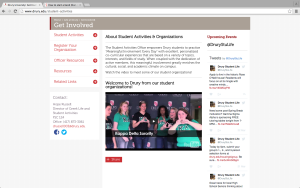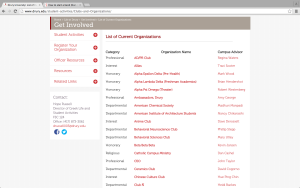
Between homework, part-time jobs, and/or sports, being a college student is a non-stop whirlwind of action from one activity to the next. It’s hard finding time to sleep, let alone devoting time to something larger than yourself. Yet that’s exactly how small campuses like Drury University function—everybody has to be involved with everything. Jenay Lamy, Student Success Coordinator and head of the Panther Passport Program, gives The Scoop some insight into how students can study hard and also be involved on campus.
Step 1: Find your free time
That’s right, I said it: free time.
“We spend 16 weeks hitting the books and hitting the Internet and all these hard things, and we don’t put a lot of emphasis on the time we need to recharge,” stresses Lamy. “Being a Student Success Coordinator, I have seen a correlation between the hours of time studying compared to the hours of time spent not studying.”
So crack open that planner, and find out exactly when your free time is.
Step 2: Explore your options
Whether it’s a couple of hours on a Friday, or varying days throughout the week, there are extracurricular options that will fit your busy schedule. Take 30 minutes out of your day and explore. This is made easier because according to Lamy, “The great thing about Drury is that we have a lot of things online.”
Many of Drury’s student groups have open Facebook pages, all you have to do is “like” the page, or simply send them a request to be a part of the group!
Step 3: Pick the groups you want to be involved in
Pick a couple student groups you want to be involved in. There is a whole list of them posted on www.drury.edu.
Decide whether your schedule allows for short-term activities or long-term activities. For those of us who have limited free time, Lamy suggests the option of going on an alternative spring break: “You’re not having to go to class, it’s only for one week, and it helps you recharge.”
Step 4: Contact the group advisor
All you have to do is send a quick email asking about membership requirements, membership fees, etc. Lamy also recommends that you get on their list serve.
“Get on their email,” she says. “Then that way you know what they’re doing, and when their events are.”
Step 5: Be committed
You’ve found your free time, you’ve picked your activities, and the advisor would love to have you be a part of the group. So what now? Well, when you say you’re going to do something, then do it.
Lamy’s last piece of advice: “Stay committed. When you’re there doing those events, do your best to be mindful of what is happening at that moment. You’re only gaining when you allow yourself to gain, and that’s putting those barriers down. When you actually commit to these events and actually challenge yourself, you’ll find that you will have a good time, and that adds experience.”




